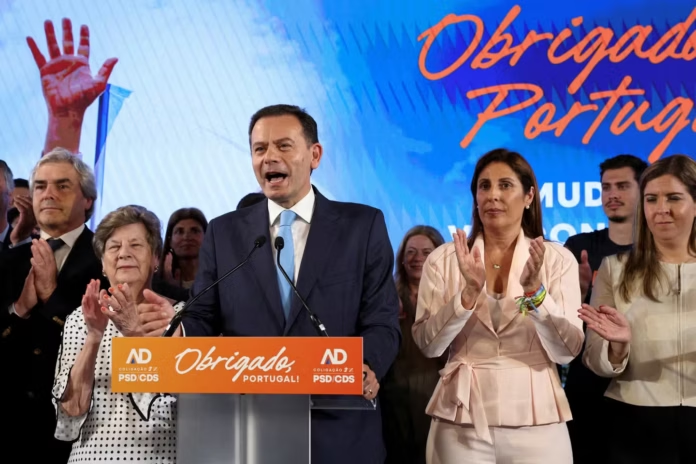Ten years ago, the political pendulum swung left. Now it swings right. Another turn will come, but only if an organized force is built to channel it.
Alex V, SAV (ISA in Germany)
(This article was first published on 7 June 2025)
The recent legislative elections left Portugal with no party or coalition with a stable parliamentary majority. Overall, the results represent a strong victory for the right and far-right, with the left suffering a historic defeat. This marks a sharp political shift, with dangerous consequences for the working-class and oppressed.
The right wins — Chega triumphs
Chega was the clear winner of the night. In just a few short years, it leaped from a single seat to 58 MPs, earning 22.76% of votes. This dramatic growth signals a major realignment in voter behavior, as protest votes have migrated away from the reformist Left (essentially the Left Bloc — BE and Portuguese Communist Party) and instead are being expressed in support for the populist right.
By mentioning again and again the “50 years of corruption” since the overthrow of Portugal’s dictatorship in 1974, the party tapped directly into widespread societal discontent. Their anti-immigration rhetoric, reinforced by the former government’s (led by the traditional right-wing Social Democratic Party — PSD) own shift to the right in its final months, further boosted Chega’s appeal.
Unlike the traditional parties, Chega presented itself as unapologetically “anti-system”, to harness the real despair and alienation of Portugal’s working class. Chega managed to reach a broader voter base, encompassing not just hardened reactionaries but also segments of the working class which became disillusioned with the left and former non-voters.
Chega also capitalized on the AD’s active persecution of immigrant workers, who were deliberately targeted in a calculated strategy to deflect from broader working-class dissatisfaction. Through a “simplification” of legal immigration procedures, AD created a system that left most immigrants without legal protections, leaving them more exploitable. Police forces sympathetic to far-right rhetoric were deployed in intimidating raids meant to dehumanize immigrants publicly, consolidating Chega’s racist agenda in the public discourse.
Right-wing parties (Democratic Alliance — AD, Liberals — IL, and far-right Chega) managed to reach a combined total of over 3,740,000 votes and now hold 157 out of 230 seats—nearly two-thirds of the parliament. This is not a “right-wing push” with ideological coherence. It’s a collapse of representation and of trust in the existing political alternatives.
Despite the ongoing corruption scandal involving outgoing Prime Minister Luís Montenegro and internal instability, the right-wing AD coalition still manage to gain votes, thanks largely to their ability to appeal to sectors of the middle class, employers, and state functionaries who saw AD as a more reliable guardian of their interests than the PS.
This political moment in Portugal mirrors wider trends across Europe and even worldwide: the erosion of liberal democratic parties and institutions, and the rise of populist right movements. Chega exemplifies Portugal’s contribution to the world’s right wing shift. Even when not holding government power, right-wing forces typically hold the strongest momentum. Trumpist movements lead in the polls across Europe’s three biggest powers: Germany, Britain, and France, and are well positioned for major upcoming elections in Latin America.
Like its international peers, Chega has risen on the back of NATO-aligned militarism and EU-backed austerity, both of which have been enthusiastically supported by established parties. These forces have criminalized anti-fascist organizing, normalized racist policing, and helped pave the way for the far-right’s growth at both the ballot box and in the streets.
While much of Chega’s support comes from reactionary social elements—landowners, employers, landlords, and police—its success in the poorest southern districts like Portalegre, Beja, and Faro shows how its demagogy resonates with impoverished working-class communities left behind by all wings of the political establishment.
The collapse of the “Socialist” Party and left
The most telling indicator of the decay of the political establishment is the steep decline of the “Socialist” Party (PS), a key architect of post-25 April (when the 1974 revolution began) Portugal. After governing for more than two decades within the past 30 years, PS just about secured second place with 22.83% of votes.
Even with an absolute majority won in January 2022, the last PS government collapsed under the weight of (mostly) indirect austerity—rising inflation, interest rates, crumbling public services, and endless corruption scandals. António Costa’s administration became synonymous with inertia, fueling Chega’s narrative of systemic rot in Portugal.
The ‘Green’ left formation Livre’s minor electoral gains and adoption of a more confrontational approach towards the right do not offset the electoral erosion of the broader left. The Left Bloc (BE) and the United Democratic Coalition (CDU — a Communist Party front) lie in disarray with the worst results in their history (1.99% and 2.91% respectively). A decade ago, in the heat of mass struggles, they regularly polled over 20% combined.
These parties are now paying the price for their role during the “Geringonça” period, where they supported the PS government, without formally entering a coalition. By functioning as appendages of the PS, BE and CDU became politically indistinguishable from the very system they were supposed to challenge. They blunted social mobilization, absorbed discontent into parliamentary routines, and forfeited their credibility as an alternative.
The historical moment of the early-mid 2010s, when massive anti-austerity protests propelled the Left’s growth, is long gone. Still today, the leadership of the BE and PCP have learned nothing, and offer no clear alternative—only the fantasy of reconstructing a softer, more credible Geringonça 2.0.
The problem isn’t merely electoral tactics, it is the political orientation of these parties. Their leaderships doubled down on reformism and moderation at precisely the moment when capitalism’s crisis demanded clarity and confrontation. Now, their alliance with PS not only looks like a strategic mistake but a historical error: they helped demobilize class struggle while PS took the credit for stabilising the system after a deep crisis, before collapsing under its own contradictions.
The response from the leaderships of these parties? Resignation and no analysis. Long-term PCP leader Jerónimo de Sousa speaks vaguely of “challenging times,” while Mariana Mortágua (BE) laments that “we do not choose the times we live in” and that there was an unfavorable “correlation of forces”. Yet it is precisely their misleadership that has made these times so difficult for the left and reinforced a negative correlation of forces! This is a way of dodging responsibility as in a moment of systemic crisis, they offered no vision or alternative—their refusal to break from PS and adopt a revolutionary program hollowed out their support and ceded ground to the far right.
The right’s hollow victory
The conservative Democratic Alliance (AD), led by Luís Montenegro, secured 31.21% of votes. Benefiting from the hefty budget surplus inherited from the PS government, Montenegro’s administration distributed temporary concessions to targeted groups—police and soldiers, health workers, teachers and firefighters—to pacify discontent. But his financial lee-way was short-lived. The Central Bank warned of looming budgetary slippage and likely failure to meet EU fiscal targets by 2025. GDP declined by 0.5% in the first quarter, worsening the situation.
With the economy facing further deterioration, especially in the tourism and automobile sectors heavily dependent on EU demand, Portugal is entering a period of likely prolonged instability. The automobile sector, in particular, is now exposed to intense competition from Chinese EV manufacturers.
AD’s electoral growth is underwhelming, and even its liberal appendage, the Iniciativa Liberal (IL) which was supposedly on the rise, scored a modest 5.5%, appealing to only a narrow layer of voters of the middle and upper-middle class.
The only path to a right-wing parliamentary majority lies in a coalition between AD and Chega. Yet, such a government would be deeply unstable, not only due to Chega’s erratic populism but also due to the contradictions between conservative and radical nationalists.
Down the line, as AD continues its shift to the right and normalizes cooperation with Chega, “red lines” against collaboration with the far right will likely erode. For the bourgeoisie, an AD-Chega coalition might no longer be unthinkable.
Is fascism around the corner?
It would be a mistake to catastrophize or worse, blame the people for this outcome. What we are witnessing in Portugal is part of the European pattern: the discrediting of liberal establishments, crisis of the reformist left and a surge of right-wing populism, riding the wave of social dissatisfaction.
Chega is a dangerous, racist, reactionary party. But it is not fascist in the classical sense. Historically, fascism involved mobilizing enraged petty-bourgeois masses to physically crush the labor movement and destroy all forms of worker organization. Chega lacks both the mass movement and the explicit counter-revolutionary function that defined fascism in the 20th century. However, as in other countries, its rise will embolden elements even further to its right, including fascistic and “street fighting” forces.
Chega, while repressive and reactionary, remains a tool of capitalist preservation, seeking to pit the penultimate against the last—turning workers against the left, migrants, minorities, women, and Queer people to deflect from the real causes of social misery.
The moment André Ventura (Chega’s President) gets closer to power, his anti-system facade will begin to crumble, revealing him as just another reactionary defender of capitalist interests. When that happens, the broad base of Chega’s support can fracture, and the unresolved social anger that now feeds Ventura will explode in unpredictable directions. If the left can rebuild and the working class movement reassert itself, a new shift to the Left, opening up the possibility of revolutionary change, can be put squarely back on the agenda.
As international tensions escalate, with U.S. imperialism being questioned and militarism ramping up across NATO and the EU, the political center will likely continue collapsing, pushing more people toward radicalized political options. Portugal is not immune to this dynamic.
The left’s task: Rebuilding from below
Ten years ago, the political pendulum swung left. Now it swings right. Another turn will come, but only if an organized force is built to channel it.
We got a glimpse of this potential during the CP (Portugal Railways) strike earlier this year, which paralyzed transport and disrupted the electoral campaign. That strike had 100% participation, including workers who likely voted for Chega.
The CP strike revealed the immense latent power of the working class, a power that needs to be organized, politicized, and mobilized. And when workers move collectively, all the division methods that capitalism and the far right thrive on will fall away. On the picket line, side by side, minorities, queers, migrants, and all Portuguese workers will find common cause in struggle.
The priority must be to rebuild a working-class left from below, one that clearly identifies the enemy—the capitalist system itself—and adopts a revolutionary socialist programme. A real alternative cannot be built on nostalgia for the geringonça, or on vague appeals to constitutional values and the “conquests of April”. Those appeals resonate little with a generation that sees the system as corrupt and broken. To treat the Constitution (adopted after the Portuguese revolution) as a shield against fascism while the material basis for constitutional rights is eroded daily is to mistake the form for the content.
The Constitution’s guarantees mean little when workers are priced out of housing, public healthcare collapses, and wages are eaten away by inflation. Clinging to institutionalism in the face of collapse is not strategy—it’s paralysis. It is not through moral preaching or parliamentary illusions that change will come, but through class struggle, revolutionary socialist ideas, and mass mobilization.




